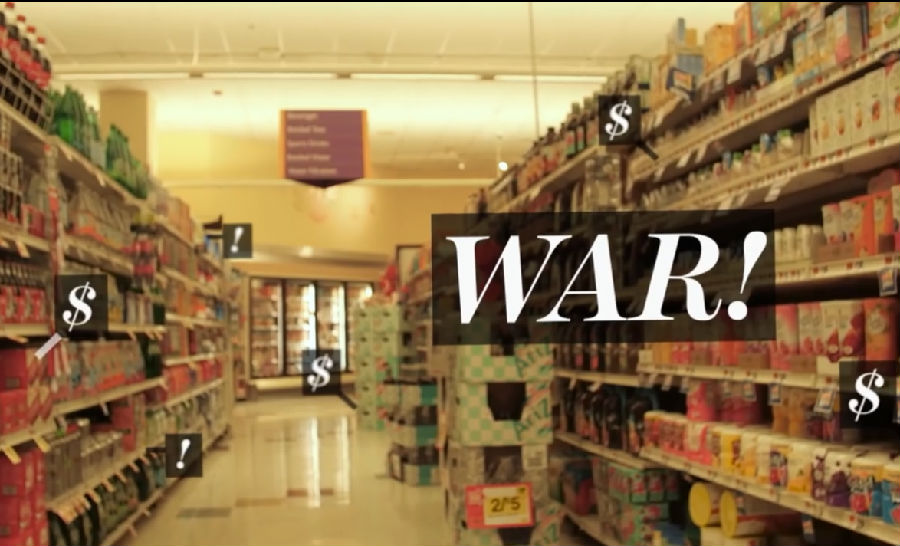(单词翻译:单击)
This is the grocery ice cream aisle.
这是超市的冰淇淋柜。
And this is a witness hiding behind a screen to protect their identity and their business.
这位则是隐藏在屏幕背后保护其品牌及商业利益的见证人。
The two are connected.
这二者有着密切的联系。
This is a frost-covered door to a world of delicious treats,
这扇上霜了的玻璃门背后是一个美味点心的国度,
and this is John Kerry in September 1999, listening to a witness whose voice is scrambled to preserve their anonymity.
这则是1999年9月John Kerry在听某证人的证词,该证词已经做过变声处理,以便保护当事人的信息。
“It’s not about the product.”
“这跟产品无关。”
Really weird voice-scrambling here, by the way.
顺便说一下,变声很诡异啊。
There is a war going on in the aisles of grocery stores.
超市的货架上正在上演一场战争。
A lot of grocery shelf space is bought by companies selling you stuff, long before you see it while you’re shopping.
在你进超市购物看到那些商品之前,供货商们很早就已买下那些货架。
It can cost as much as $5 million dollars to get your candy bar near the checkout in a bunch of grocery stores.
要想把你们品牌的糖果放到一些超市靠近收银台的货架上,你可能需要支付高达500万美元的费用。
And even if you know about these so-called slotting fees, the arguments for and against them might surprise you.
即便你对这些所谓的进场费已经有所了解,针对进场费的争论也可能让你大吃一惊。
Slotting fees say something about the hidden transactions that let buyers and sellers work together, and occasionally fear each other, too.
进场费透露了让消费者与商家既携手合作又相互畏惧的隐秘交易。
Imagine you’re a new ice cream maker and you want to sell delicious Generic Ice Cream, the ice cream with delicious generic bits.
试想你是刚入行的冰淇淋制造商,你想把美味的非商标冰淇淋,也就是常见的那种味道还不错的冰淇淋卖出去。
You can’t just start selling your ice cream.
你不能说卖就卖。
If you want to be in a major grocer, you have to pay.
如果你想入驻大超市,你得给钱。
Journalist Gary Rivlin recently wrote about the slotting fee economy in a report for the Center for Science in the Public Interest.
记者Gary Rivlin最近就给公共利益科学中心写了一篇关于入场费经济的报道。
His story of a real ice cream brand called “Clemmys” is a guide to what might happen to your Generic Ice Cream brand.
报道中一个叫做“Clemmys”的冰淇淋品牌,或许可以给你的非商标冰淇淋提供一些借鉴。
To get Generic Ice Cream inside a freezer door, you’d have to pay $30,000 to get in 350 stores — and that’s at a discount.
要想把你家的冰淇淋陈列在350家超市的冰柜里,你需要支付3万美元的入场费,这还是折扣价。
Once you got in, sometimes you’d have to pay up to stay on the shelf.
入驻之后,要想持续停留在货架上有时还要继续交钱。
And you’re competing against giants like Nestlé and Unilever.
此外,你还要和雀巢、联合利华等大品牌竞争。
Rivlin reports they control basically 90 percent of the freezer doors because they’d already paid up.
Rivlin在报道中指出,这些大品牌占据了超市90%的冰柜,因为他们早已全款付清入场费。
For giants like them, a $30,000 fee isn’t a lot — for you, however, it might be a major cost.
对这些冰淇淋巨头来说,3万美元的进场费根本不算什么,但对你来说,这可能就是你的主要成本。
Even then, paying for your Generic Ice Cream to get on the shelves wouldn’t necessarily give you control —
即便如此,即便付了钱,你的冰淇淋也成功上架了,你也不一定就有了主动权。
Instead, category captains, the big guys who pay the most, draft where every item goes, which can determine how well things sell.
相反,产品种类中的“领队” ,也就是给钱最多的大品牌,决定了每种商品的位置及其销售表现。
Drawings like these, called planograms, help stores keep things organized.
这类图纸,即“货架图”,能够帮助销售门店保持货物陈列有序。
See, Generic Soda goes here, Generic Energy here.
比如,非商标苏打水放这边,非商标能量水放这边。
But they also help retailers sell space.
然而,这种图纸也能帮助零售门店出售陈列空间。
Each spot comes at a cost.
每个陈列位置都是带价签的。
The same is true of most of what you see in the candy, cookie, chip, and soda aisles.
这种情况同样适用于糖果、曲奇、薯条和苏打水货架。
To writers like Rivlin, it’s no better than a bribe.
对Rivlin这样的作家来说,这无异于贿赂。
Soda and candy pays up, and consumers have limited choice.
巨头们提前付清了苏打水和糖果的入场费,消费者的选择就变得十分有限。
Your delicious Generic Ice Cream never hits the shelves.
你美味的非商标冰淇淋也就永远上不了架。
The Bureau of Alcohol, Tobacco, and Firearms banned stuff like this for alcohol in 1995.
1995年,烟酒枪炮及爆炸物管理局曾经禁止酒类售卖进行类似操作。
And if you’re a regular reader of Frozen & Refrigerated Buyer,
如果你是Frozen & Refrigerated Buyer杂志的忠实读者,
you’ll know vendors are constantly fighting against these slotting fees.
你就知道供应商一直都在与这些入场费作斗争。
So why are vendors resigned that slotting fees are here to stay?
那供应商们为什么又妥协了让入场费继续存在呢?


